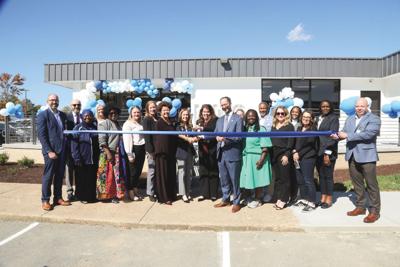Previously, when the Mental Health Cooperative received a call that a child was experiencing a mental health crisis, they had two options: make a safety plan and send the child home, or arrange for inpatient treatment. Finding availability for the latter was always a challenge, and in the meantime, kids sat at hospitals or the Davidson County Juvenile Detention Center awaiting the next move.
That gap in services is now filled, thanks to last week’s opening of the Children and Youth Crisis Stabilization Unit. The center serves kids ages 4 to 17, with an expected average stay of three to five days. It offers 17 beds and staff specially trained to treat children and families.
“This gives us an in-between service that we can help them work through the current crisis situation, and hopefully get them connected to what they need to be successful after that crisis is over and upon discharge,” says Ruth vanBergen, senior vice president of emergency psychiatric services at the Mental Health Coop.
Referrals for youth most commonly come from the emergency room — a go-to for lots of families when their child is having a crisis, vanBergen says. She hopes to see people use the crisis stabilization unit for walk-ins in the future.
“We’ve always struggled with, we don’t have a lot of options for kids in crisis,” she says. “To be able to have this, and if you compare how it looks now versus how it looked 10, 20 years ago, it’s just a world of difference in what we’re able to offer the community.”
Another common referral source is the Davidson County Juvenile Court and Juvenile Detention Center. Judge Sheila Calloway explains that she regularly encounters kids in crisis, but the juvenile court does not offer mental health services on site or immediately. These are children who are not necessarily suicidal or homicidal, but do need immediate support.
“If it’s a kid that gets brought to us in the middle of a crisis, we’ll be able to reach out to Mental Health Coop, and they actually have a crisis center for them to go [to], versus sitting at our facility waiting on something,” Calloway tells the Scene. “We’ll be able to actually connect them immediately to this service, which is a beautiful thing.”
A new city program aims to free up ambulances and address low-acuity crisis calls
The Mental Health Coop is called on to meet with kids who need extra mental health support at the detention center too. The Nashville Center for Youth Empowerment, a project granted $88 million in the latest Metro capital spending plan, will double the size of its previous space and offer more services on site. The center is set to open in the spring or early summer of 2027, Calloway tells the Scene.
Mayor Freddie O’Connell has focused on youth mental health during his tenure, establishing an Office of Youth Safety earlier this year and naming Phyllis Hildreth the office lead in April. At the ribbon cutting for the Children and Youth Crisis Stabilization Unit, O’Connell noted that nearly 1 in 5 Tennessee high school students reports having significant anxiety or depression, a figure released in the Centerstone 2025 Youth Mental Health Report.
“Our goal is to equip our young people with the skills, relationships and safe places they need to thrive, and in doing so, to reduce interactions between young people and the criminal legal system,” O’Connell said at last week’s ribbon cutting for the crisis stabilization unit.
The Mental Health Coop has been in high demand in recent years. The city tapped the organization to lead the mental health component of two 911 response options: REACH co-response with paramedics, and Partners in Care with police. The Mental Health Coop is also involved with the Behavioral Care Center, an alternative to jail through the Davidson County Sheriff’s Office.
The ribbon cutting for the center also represented a partnership between O’Connell and Gov. Bill Lee, whom the mayor thanked for his support on the project. The Tennessee General Assembly, through the Department of Mental Health and Substance Abuse Services, set aside $5 million to create a crisis stabilization unit for youth in both Knoxville and Nashville.
At the ribbon cutting, Commissioner Marie Williams of the Tennessee Department of Mental Health and Substance Abuse Services asked the crowd to repeat this phrase after her: “Treatment works.”
“Our system’s not broken — our system’s underfunded,” Williams said at the event. “We know what works, and we stand here today with a provider that also knows what works.”






